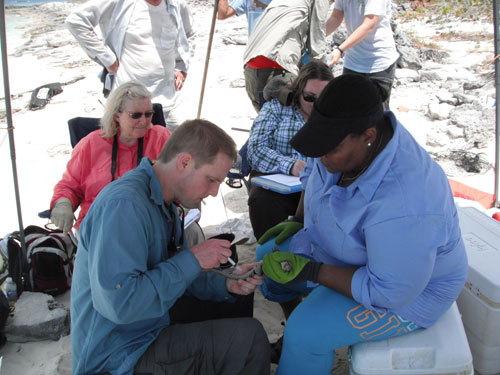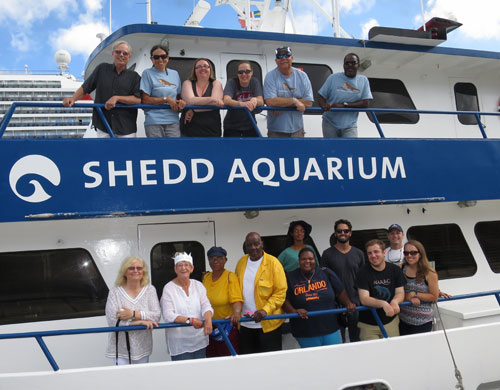|

|
 |
|
Last Updated: Feb 13, 2017 - 1:45:37 AM |

Park Wardens Help Study Rare Bahamian Rock Iguanas
Bahamas National Trust (BNT) park wardens Shenica Campbell, the new park warden in Nassau and Ellsworth Weir, Grand Bahama Deputy Park Warden, recently went on a week-long research expedition with the Shedd Aquarium, to study the Bahamian Rock Iguana. Pictured is the research team before their departure.(Photo: BNT)
|
Nassau, Bahamas – Bahamas National Trust park wardens joined an international research team recently to learn more about the rare and endangered Bahamian Rock Iguana. BNT park wardens Shenica Campbell, the new park warden in Nassau and Ellsworth Weir, Grand Bahama Deputy Park Warden, participated in the research expedition organised by the Shedd Aquarium for a week-long research expedition in the Exuma Cays.
The purpose of the trip was to assess the health of the iguana populations on the cays, to record information and to insert identification tags into the skin of the ones that weren't already being studied. The research project took body measurements and blood samples from the iguanas, identified and recorded the sex of the iguanas, removed ticks and recorded and other injuries, and if the iguana had been captured before, compared the current health of the iguana to the information previously recorded.

206 Iguanas Tagged on Various Cays During Research Trip
During the tagging process, the BNT team learned valuable information about the iguanas. “I learned about the importance of conservation as it relates to the endangered Bahamian Rock Iguana,” said Ellsworth Weir, Grand Bahama Deputy Park Warden. “Feeding them takes them away from their natural food cycle and also causes problems for the iguana, especially when that food is thrown into the sand. It is also dangerous to allow people to hand feed them since a red fingernail can be mistaken for food.” Pictured is the research team tagging an iguana.(Photo: BNT)
|
“I learned about the importance of conservation as it relates to the endangered Bahamian Rock Iguana,” said Ellsworth Weir, Grand Bahama Deputy Park Warden. “Feeding them takes them away from their natural food cycle and also causes problems for the iguanas. It is also dangerous to allow people to hand feed them since a red fingernail can be mistaken for food.”
Rock Iguanas in The Bahamas are protected by the Wild Animals Protection Act, as they are currently listed on the International Union for the Conservation of Nature (IUCN) list as "rare". Additionally, the Convention for International Trade in Endangered Species (CITES) lists the Rock Iguana as near extinction or very endangered. As a result, the trade of iguanas across nations is prohibited. Subspecies of the Bahamian Rock Iguanas are found on Andros, San Salvador, Acklins, Mayaguana and in the Exuma Cays.
“Once again we had a very successful expedition because of everyone’s efforts. We captured and processed a total of 205 iguanas, moreover, thanks to the hard work of the team, we observed and processed the most iguanas on Pasture Cay since 2006!” said Chuck Knapp, Facilitator of the Research Trip, Shedd Aquarium.
The research trip started in Georgetown, Exuma aboard the research vessel R/V Coral Reef II and sailed to numerous cays, until they returned to Nassau. In addition to the iguana study, the BNT team also assisted the Island Conservation Organisation with the eradication of the invasive rats on some of the cays.
This research trip has taken place every year since the late 1970s, rotating between the Exumas and Andros. This year’s research team included members of Shedd’s staff, interested scientists and BNT staff members.
“The intent of the park wardens attending the research trip, was for us to participate and learn about the research through hands on training,” said Ellsworth Weir, Grand Bahama Deputy Park Warden. “By participating in the research, we were able to play a greater part in learning about the iguanas, and we are now able to educate others about the great importance of this work.”
Next year’s trip will visit Andros, and both the BNT and the Shedd Aquarium hope the success of this year will be matched on next year’s research trip. Weir concluded, “We need to educate more people about this, as a tagged iguana can be monitored throughout its life, and population growth can be gauged through new captures.”

© Copyright 2014 by thebahamasweekly.com
Top of Page
|
|
 |

|
